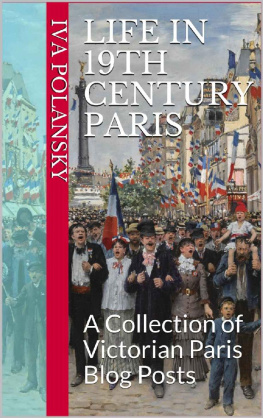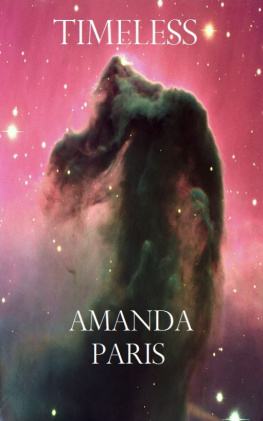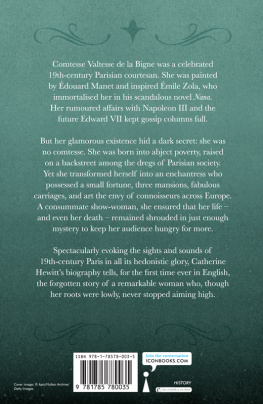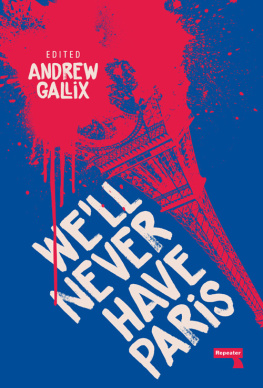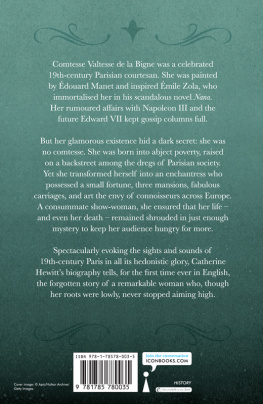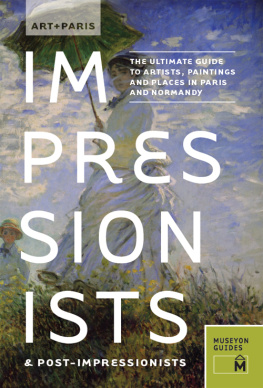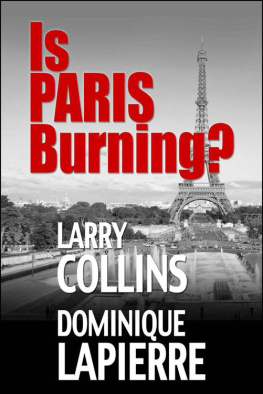Iva Polansky - Life in 19th Century Paris: A Collection of Victorian Paris Blog Posts
Here you can read online Iva Polansky - Life in 19th Century Paris: A Collection of Victorian Paris Blog Posts full text of the book (entire story) in english for free. Download pdf and epub, get meaning, cover and reviews about this ebook. year: 2019, genre: History. Description of the work, (preface) as well as reviews are available. Best literature library LitArk.com created for fans of good reading and offers a wide selection of genres:
Romance novel
Science fiction
Adventure
Detective
Science
History
Home and family
Prose
Art
Politics
Computer
Non-fiction
Religion
Business
Children
Humor
Choose a favorite category and find really read worthwhile books. Enjoy immersion in the world of imagination, feel the emotions of the characters or learn something new for yourself, make an fascinating discovery.
- Book:Life in 19th Century Paris: A Collection of Victorian Paris Blog Posts
- Author:
- Genre:
- Year:2019
- Rating:5 / 5
- Favourites:Add to favourites
- Your mark:
- 100
- 1
- 2
- 3
- 4
- 5
Life in 19th Century Paris: A Collection of Victorian Paris Blog Posts: summary, description and annotation
We offer to read an annotation, description, summary or preface (depends on what the author of the book "Life in 19th Century Paris: A Collection of Victorian Paris Blog Posts" wrote himself). If you haven't found the necessary information about the book — write in the comments, we will try to find it.
Iva Polansky: author's other books
Who wrote Life in 19th Century Paris: A Collection of Victorian Paris Blog Posts? Find out the surname, the name of the author of the book and a list of all author's works by series.
Life in 19th Century Paris: A Collection of Victorian Paris Blog Posts — read online for free the complete book (whole text) full work
Below is the text of the book, divided by pages. System saving the place of the last page read, allows you to conveniently read the book "Life in 19th Century Paris: A Collection of Victorian Paris Blog Posts" online for free, without having to search again every time where you left off. Put a bookmark, and you can go to the page where you finished reading at any time.
Font size:
Interval:
Bookmark:
Iva Polansky
Life in 19 th Century Paris
A Collection of Victorian Paris Blog Posts
Introduction
The blog Victorian Paris was born from my research for the novel Fame and Infamy set in the early 1870s Paris just after the end of the Second Empire and the murderous uprising that followed its fall. I do like research. I do like it as much as I do like writing. Id even say that Im a greedy researcher, an avid collector of research material, a hoarder of facts. After the novel was finished, I was left with a small mountain of books and articles about the period and I decided to put the material to use in a blog.
Why Victorian Paris ? The name of the blog raised at least one eyebrow and the reader criticized my choice. What has Queen Victoria in common with Paris? Perhaps not much, even though her son, the Prince of Wales and the future Edward VII, made Paris his preferred playground. However, during Victorias placid reign, France went through one political upheaval after another, from kingdom to republic, to empire and to republic again. There is not one unifying factor in that century to put into a title. Since the blog caters to English-speaking readers interested in the Victorian period, I know of no better name for it.
This book contains articles authored by me as well as excerpts written in the 19 th century. In the majority of cases, I reveal my sources although there are several texts that I collected in the early stages of my research and which I can no longer identify. These texts are marked as Unknown Source. Many of the quoted texts were written by Americans visiting Paris and their reactions give us the advantage of comparing the French lifestyle of the era with the American one. They differed in many aspects.
The Guide to Gay Paree
A Guide for the English and American Traveller in 1869 or How to see PARIS for 5 guineas
How to get there

PARIS! - gay and beautiful Paris - rich in architectural treasures, teeming with historic associations of deepest interest - favoured in its genial climate - replete with endless novelty - the abode and dictator of European fashion - full of all that art and science can contribute to beguile the sense - its people renowned for their wit and daring - in fact, in sum, in total, THE PARADISE OF TOURISTS!
From London
Of the different routes available, the speediest is that adopted by the South-Eastern Railway, whose accelerated special tide trains leave regularly from Charing Cross, passing to Paris via Sevenoaks, Folkestone (indifferent refreshment room), and Boulogne. Weather permitting, the entire trip is of a duration c. 10 hours. Return ticket, one month's validity, 3 10s.
Passports
Since a French regulation of 1860, English citizens are now exempt from the expense and annoyance of passports; but although by no means absolutely necessary , one of these documents, or a card of identity, is most strongly recommended .
Customs
Attention is generally paid only to cigars, on which a levy of 10 centimes per item is payable. Certain books and newspapers, of inflammatory or political tendency, can cause difficulties or embarrassment.
Money
25 francs equal 1; 5 francs equal $1.
Arrival in Paris

Recent history
1789 Capture of the Bastille
1792 Republic proclaimed
1793 Execution of Louis XVI
1804 Napoleon Bonaparte proclaimed Emperor.
At the outbreak of the Revolution in 1789, one-third of Paris had been occupied by ecclesiastical property. Since much of it was subsequently expropriated, and then sold to speculators or retained by the state, Napoleon availed himself of an opportunity to beautify the city, opening the rue de Rivoli, completing the Louvre Palace, and beginning the Arch of the Etoile.
1814 Abdication of the Emperor. Restoration of the Bourbon Louis XVIII.
1824 Succession of Charles X
1830 Three-day revolution. Louis-Philippe, Duke of Orleans, proclaimed King. He completed the Arch of the Etoile, the Madeleine, enlarged the Htel de Ville, and repaired many neglected monuments, as well as widening principal thoroughfares. During this reign, Paris was surrounded with the present fortified wall and ditch, and the detached forts erected.
1848 February revolution. After two days' fighting, Louis Philippe fled, and republic was proclaimed. The words 'Libert, Egalit, et Fraternit' met the visitor's eyes in every direction; they have now been erased. Louis Napoleon, son of Louis Bonaparte, King of Holland and nephew of the first Napoleon, elected by universal suffrage President of the French Republic.
1851 2 December. Discretion compels us to pass over the coup d'tat which took place on this date. Suffice it to say that exactly a year later, Louis Napoleon was elected Emperor by universal suffrage, and the present regime, known as the Second Empire was established. In 1853 Louis Napoleon married the present Empress, Eugnie de Montijo. Since these events, works of public utility in Paris have proceeded at a pace quite stupendous, throwing into shade everything previously achieved in any city of the world. Picturesque but insalubrious quarters of narrow and crooked streets have been cleared, the boulevards extended, railways constructed.
Paris today
Today visitor to Paris will find a population between one and a half and two million. In 1860 the line of fortified walls which surrounds the city was made the municipal boundary; this wall is rather more than 22 miles in circuit and has 66 entrances or gates.
The city is divided into 20 arrondissements, with their own administrations, over which are placed the Prefect of the Seine, Baron Georges Haussmann, and his municipal council. The modern fashionable quarter comprehends the bright and brilliant rue de Rivoli, Place Vendme, Boulevard des Italiens and the Champs Elyses. The Palace of the Tuileries is the Paris residence of the Emperor and Empress; on the Ile de la Cit are the law courts, central police office, and the great hospital; there is nothing like 'the City' in London - the Bourse or Stock Exchange being close to the fashionable quarter. In the Faubourg Saint-Germain, on the Left Bank of the river Seine, stand the vast hotels of the nobility, in which some of the traditions of old French society are maintained; in the adjoining Latin Quarter, many thousands of students lead a life of riot and license hardly to be understood by a foreigner. To the East, in the Faubourg S. Antoine, are numerous manufactories and the dwellings of those who work in them, formerly the hotbed of terror and insurrection. On the outskirts, as in the Faubourg S. Victor, Mouffetard, Belleville &c, are to be found the most wretched of the population; but Paris may at least be proud that it possesses fewer dens of misery, filth, and vice than the vicinity of Tottenham Court Road or Drury Lane can exhibit.
Find a hotel
Hotels and Accommodations
Paris contains some 4,000 hotels and lodging houses, many of them bearing in their names the evidence of the entente cordiale - hence the Hotels Chatnam, Bristol, Windsor, Manchester, Brighton, Liverpool, Westminster, Dover, Bedford, Canterbury, Richmond, Lancaster, Clarendon, Nelson, Byron, Walter Scott, Prince Regent and several Albions, Londres, Victorias, Iles Britanniques, and Angleterres. Those on an expansive budget should note:
Grand Htel, Boulevard des Capucines. A new hotel, financed by the Jewish bankers Pereire, of great show and size (not to be confused with its neighboring rival, the Grand Hotel du Louvre against which it has been wrangling a costly and bitter legal suit). Seven hundred rooms, for which one can expect to pay 20 francs per diem. For all the splendour of its public quarters, designed by M. Charles Garnier, do not recon on quiet, prompt attendance. There are few private w.c.s and many damp, dark corridors. More commodious to traveling agents for commercial houses than families seeking cheer and respectability. A lifting machine, operated by hydraulic press, raises clients to their floor, thus circumventing the fatigue of staircases. Electric bells operate throughout.
Next pageFont size:
Interval:
Bookmark:
Similar books «Life in 19th Century Paris: A Collection of Victorian Paris Blog Posts»
Look at similar books to Life in 19th Century Paris: A Collection of Victorian Paris Blog Posts. We have selected literature similar in name and meaning in the hope of providing readers with more options to find new, interesting, not yet read works.
Discussion, reviews of the book Life in 19th Century Paris: A Collection of Victorian Paris Blog Posts and just readers' own opinions. Leave your comments, write what you think about the work, its meaning or the main characters. Specify what exactly you liked and what you didn't like, and why you think so.

